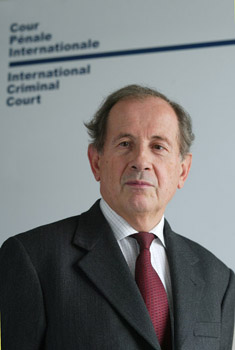
By Otto Spijkers
A bronze man, facing UN Headquarters (see picture), uses a hammer to beat a sword into a plowshare. It is a statue in the United Nations Park in New York, made by the Russian artist Evgeniy Vuchetich. It has become a symbol of the work of the United Nations and its evolution: the United Nations does not only wish to save succeeding generations from the scourge of war; it also aims to promote the economic and social advancement of all peoples. How to implement these ideals in practice?
Next to the statue, there’s a quote from the Bible:
…and they shall beat their swords into plowshares,
and their spears into pruning hooks:
Nation shall not lift up sword against nation,
neither shall they learn war any more.
Perhaps that is a bit too optimistic. But what about children? Why not assist our future generation in beating their swords into plowshares? There are (at least) two interesting recent developments: a conference on child soldiers and the first case ever at the International Criminal Court.
Only a few days ago, Paris hosted an international conference, jointly organized by the French Government and UNICEF, on children involved in armed forces and armed groups. As the French Foreign Minister Philippe Douste-Blazy said at this conference, child soldiers ‘become children who are lost for peace, lost for the development of their countries. Because even if the conflicts end, their reintegration into civil society is too often impossible.’ The outcome of the conference was a declaration of Paris Commitments to protect children from unlawful recruitment or use by armed forces or armed groups
At the same time, the first trial at the International Criminal Court is taking shape (the ICC is not a UN organ, but there is a close relationship). When you google ‘ICC’, you no longer get the ‘International Cricket Council’ or the ‘Internet Chess Club’ as the first two hits, but the ‘International Criminal Court’. Surely that must mean something?
 Anyway, back to the issue of child soldiers. On the 29th of January, 2007, the ICC’s Pre-Trial Chamber I, presided by Judge Claude Jorda (see picture), found that there was sufficient evidence to establish substantial grounds to believe that when the Forces Patriotiques pour la Libération du Congo (FPLC) was created in early September 2002, there was a common plan between Thomas Lubanga Dyilo and other high-ranking FPLC commanders to use children as soldiers and bodyguards. According to the ICC Statute, this is an international crime (Article 8(2)(b) and (e)). All documents related to this case can be found here.
Anyway, back to the issue of child soldiers. On the 29th of January, 2007, the ICC’s Pre-Trial Chamber I, presided by Judge Claude Jorda (see picture), found that there was sufficient evidence to establish substantial grounds to believe that when the Forces Patriotiques pour la Libération du Congo (FPLC) was created in early September 2002, there was a common plan between Thomas Lubanga Dyilo and other high-ranking FPLC commanders to use children as soldiers and bodyguards. According to the ICC Statute, this is an international crime (Article 8(2)(b) and (e)). All documents related to this case can be found here.

Some of the recent scholarly work on child soldiering (http://www.chrisblattman.org/Blattman.ConsequencesChildSoldiering.pdf) has actually found that the negative long-term psychological impacts are concentrated in a small minority. Blattman’s study of Child Soldiering in Uganda finds that most of the negative impact is due to delayed or lost human capital aquisition – the child soldiers lose about a year of schooling. His study, and other recent work by Miguel and Bellows (forthcoming) stresses the silver lining from these conflicts – people from areas afflicted by conflict, and child soldiers in particular, tend to participate more in politics and are much more likely to become political leaders. Anyway, I hope Thomas Lubanga Dyilo and those other villains get their due.